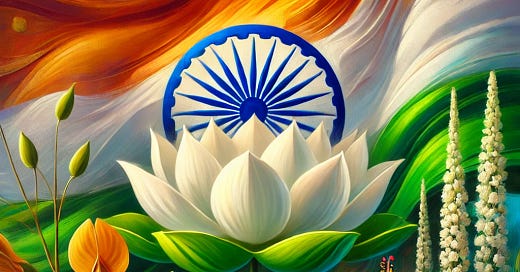How PUSHP Can Bloom: Overcoming 5 Critical Challenges on India’s Path to Inclusive Development
India's Roadmap to Development: Addressing the Challenges to Realise PM Modi's PUSHP Vision for a "Viksit Bharat".
India's Roadmap to Development: A Focus on the Challenges Hindering "Viksit Bharat"
Prime Minister Narendra Modi's PUSHP acronym for India's development vision—unveiled during an enthusiastic address to the Indian diaspora in the USA—encapsulates a hopeful outlook with its focus on a Progressive, Unstoppable, Skilled and Spiritual, Humanity First, and Prosperous India. While this vision offers an inspiring framework for India's growth, there remain critical challenges that must be addressed for the country to truly achieve the status of a "Viksit Bharat" (Developed India).
Five pressing concerns stand out: the persistent issue of Poverty, the alarming rise in Unemployment, deep-rooted Social Inequality, the spread of Hate Speech, and ongoing Political Corruption. Tackling these challenges is essential for India to realise its full potential and ensure inclusive development for all its citizens.
1. Poverty (P)
Despite notable strides in poverty reduction, a significant portion of India's population still faces severe deprivation. According to recent data, over 24.8 crore people have escaped multidimensional poverty in the past nine years, and single-digit poverty levels are expected by 2024. However, the poverty line remains at an astonishingly low threshold of ₹1,059.42 per month in rural areas and ₹1,286 per month in urban settings. While the numbers suggest progress, the reality is that millions continue to live on the margins. A broader focus on creating sustainable livelihoods, enhancing social security, and promoting equitable economic growth is needed to ensure that poverty is eliminated across the board.
2. Unemployment (U)
India faces a persistent challenge in managing unemployment. The unemployment rate surged to 9.2% in June 2024 from 7% in May, highlighting the volatile nature of job availability in the country. With a young and growing workforce, India cannot afford stagnation in employment. Though the government has introduced significant employment-linked incentives, allocating ₹2 lakh crore for job creation in the 2024 Union Budget, the need for upskilling, entrepreneurship, and fostering labour-intensive industries remains urgent. Building a future-ready workforce equipped for emerging sectors like green technology, AI, and digitalisation is critical for long-term economic stability.
3. Social Inequality (S)
Economic growth alone cannot mask the deep-rooted social and economic inequalities that persist in India. Despite India's meteoric rise as a global economic powerhouse, the benefits of this growth have not been equally distributed. Disparities in education, healthcare, income, and access to resources continue to disproportionately affect certain castes, communities, and regions. To build a truly developed India, it is essential to bridge these gaps by implementing policies that promote social justice, empower marginalised communities, and foster equal opportunities for all citizens.
4. Hate Speech (H)
The increase in hate speech, particularly against minority communities, is a growing threat to India's social fabric. In 2023 alone, 668 documented hate speech incidents specifically targeted Muslims, with 75% of these events occurring in BJP-ruled states. This disturbing trend undermines the secular and pluralistic ethos enshrined in the Constitution. For India to progress as a unified nation, it is imperative to combat hate speech through stringent law enforcement, robust civil discourse, and fostering mutual respect among diverse groups. Upholding communal harmony is key to preserving India's rich multicultural identity.
5. Political Corruption (P)
Corruption continues to be a pervasive problem, hampering India's efforts to achieve good governance and transparent administration. Ranked with a score of 40 out of 100 on the Corruption Perceptions Index in 2023, India still struggles with issues of bribery, nepotism, and opaque political processes. While anti-corruption legislation, such as the Prevention of Corruption Act (PCA), provides a legal framework, much more needs to be done to strengthen institutional accountability. Digital governance, increased transparency in public procurement, and greater public scrutiny are essential to curbing corruption and enhancing public trust.
Looking Forward
India's journey toward becoming a "Viksit Bharat" is well underway, and Prime Minister Modi's PUSHP acronym serves as a symbol of robust optimism. However, the road to development is not without obstacles. Addressing these five crucial challenges—Poverty, Unemployment, Social Inequality, Hate Speech, and Political Corruption—will require consistent effort, innovative solutions, and a commitment to inclusive growth. By tackling these issues head-on, India can truly realise its vision of a prosperous, harmonious, and developed nation that leaves no one behind.
Citations
[1] PM Modi's speech on multidimensional poverty
[2] PM Modi calls Indian diaspora 'Rashtra Dhoot'
[3] Anti-corruption trends in India
[4] Indian sectarianism and political issues
[5] Corruption in India - Wikipedia
[6] Union Budget 2024 - Employment-linked incentive schemes
[7] Digital divide and Digital India
[8] Report on hate speech in India





……proposals/projects on paper look very convincing and result oriented. Amongst these, if we are able to eradicate Political Corruption itself, other four will get minimised to the large extent….But gone are the days of Pandavas & their holy Gurus, we don’t like to see the bird on the tree itself, leave aside the eye of the bird….